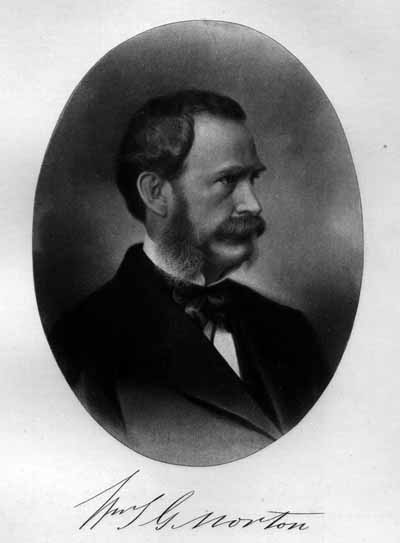As a young man, William Morton learned about the torments of surgery. He underwent an operation without anaesthesia in Cincinnati. Fortunately, he survived.
Morton was born in 1819 in Charlton, a village in Worcester County, Massachusetts. He had a common school education at Northfield and Leicester Academies. Morton tried his hand variously as a clerk, printer and a salesman in local Boston business houses. But he didn't find the work either satisfying or lucrative.
In 1840, Morton enrolled at the world's first dental school, Baltimore College of Dental Surgery. He left without graduating. Instead, in 1842-3 Morton became a pupil and then business partner of Hartford dentist Horace Wells. The partnership wasn't a great success. It was dissolved after six months.
Shifting track again, in 1844 Morton became a student at Harvard Medical School. He signed up partly to increase his medical knowledge, but partly it seems to impress the woman he loved and later married, Rebecca Needham. Again, Morton never completed his degree. To improve his understanding of chemistry, he attended the lectures of Professor Charles Jackson, from whom he first learned of the properties of ether. During 1844, Jackson demonstrated before his chemistry classes that the inhalation of sulphuric ether causes loss of consciousness. In the light of Jackson's later claim to be the inventor of etherization, it is puzzling why he did not ask one of his surgical colleagues at Harvard to apply this knowledge and practise painless surgery. The pre-history of anaesthesia is a long chapter of missed opportunities.
Morton continued his dental practice as a means to finance his medical studies. Over a decade before, he had introduced a new kind of solder by which false teeth could be fastened onto gold plates. It was clearly desirable to find a good method of extracting the roots of old and diseased teeth with the minimum of pain. Morton initially experimented with opium, stimulants and Mesmerism. Opium relieves pain; dopaminergic stimulants can indeed act as analgesics too; and Mesmerism can sometimes work with extremely suggestible patients and a charismatic doctor. Yet none of these options proved satisfactory.
Fortunately, inspiration was imminent. Morton was present in the surgical amphitheatre in Massachusetts General Hospital (MGH) when his former business partner, Horace Wells, failed to convince a scornful young audience that nitrous oxide offered a route to painfree surgery. Morton consulted his erstwhile tutor Professor Jackson about the possibility of using a stronger agent. Neither man could later agree on precisely what Morton asked, nor how Jackson responded; but most scholars believe that Jackson advised Morton to use ether. After conducting various experiments on himself and other animals, Morton successfully performed a dental extraction in his office on Boston merchant Eben Frost. A favourable journalistic account of this exploit in the local Boston press caught the eye of junior surgeon Henry Bigelow. Bigelow arranged with MGH head surgeon John Collins Warren to stage a public performance of the revolutionary procedure.
At the appointed hour, Morton did not appear. So Dr Warren prepared to start operating on his terrified patient in the time-honoured manner. Then Morton hurried into the amphitheatre. He was late because he had been fiddling with his "Letheon" inhaler, the newly-designed ether-delivery apparatus he was seeking to patent. His tardiness increased the scepticism of the audience of medical students and surgeons. Much to their astonishment, however, both the anaesthetic and the operation passed off peacefully. Until the anaesthetic era, surgery was typically an exceedingly noisy affair, punctuated by blood-curdling screams and piteous moaning from a writhing patient. But this operation was conducted in rapt silence. 52 year-old printer Edward Gilbert Abbott (1825-55) inhaled from the Letheon, passed out, lay insensible throughout Warren's excision of his vascular tumour; and then revived unharmed. Bigelow wrote up Morton's triumph in his paper Insensibility during surgical
operations produced by inhalation. The news soon echoed round the
globe, mid-19th century communication structures permitting.
Avaricious and unscrupulous, Morton was not quite the monster of depravity he has been painted by revisionist historians. He offered free rights to his innovation to all charitable institutions throughout the country, and undoubtedly he was ardently in favour of the abolition of surgical pain, albeit with profit to himself. Morton administered ether anaesthesia to thousands of stricken soldiers in the American Civil War.
Yet Morton's later years were rarely happy. He petitioned US Congress three times for recognition of his priority, and rights to the profits derived therefrom. He even managed to secure an a interview with the fourteenth President of the USA (1853-57), Franklin Pierce, to press his case. Morton was unsuccessful. His nemesis, Professor Jackson, still had influential friends. Other candidates for glory, notably Wells and Dr Crawford Williamson Long, also surfaced to muddy the waters. Litigation consumed Morton's energies and drained his limited funds. Away from controversy, he spent time in agricultural pursuits in Massachusetts, where he raised and imported fine cattle. But the failure of the world adequately to recognise and reward his unique contribution to human well-being rankled deeply as long as he lived.
At the age of 48, Morton died suddenly of “congestion of the brain”, probably a cerebral haemorrhage. Deeply in debt, he had travelled to New York City in the middle of a deadly summer heatwave. Morton had been outraged to read an article in the Atlantic Monthly that credited the invention of etherization to Professor Jackson. Jackson outlived his student but died in an asylum, insane.
As ever, Darwinian life is horribly tragic. Yet the story of dentist William Morton is a reassuring reminder that great deeds can be accomplished by moral and intellectual pygmies.
